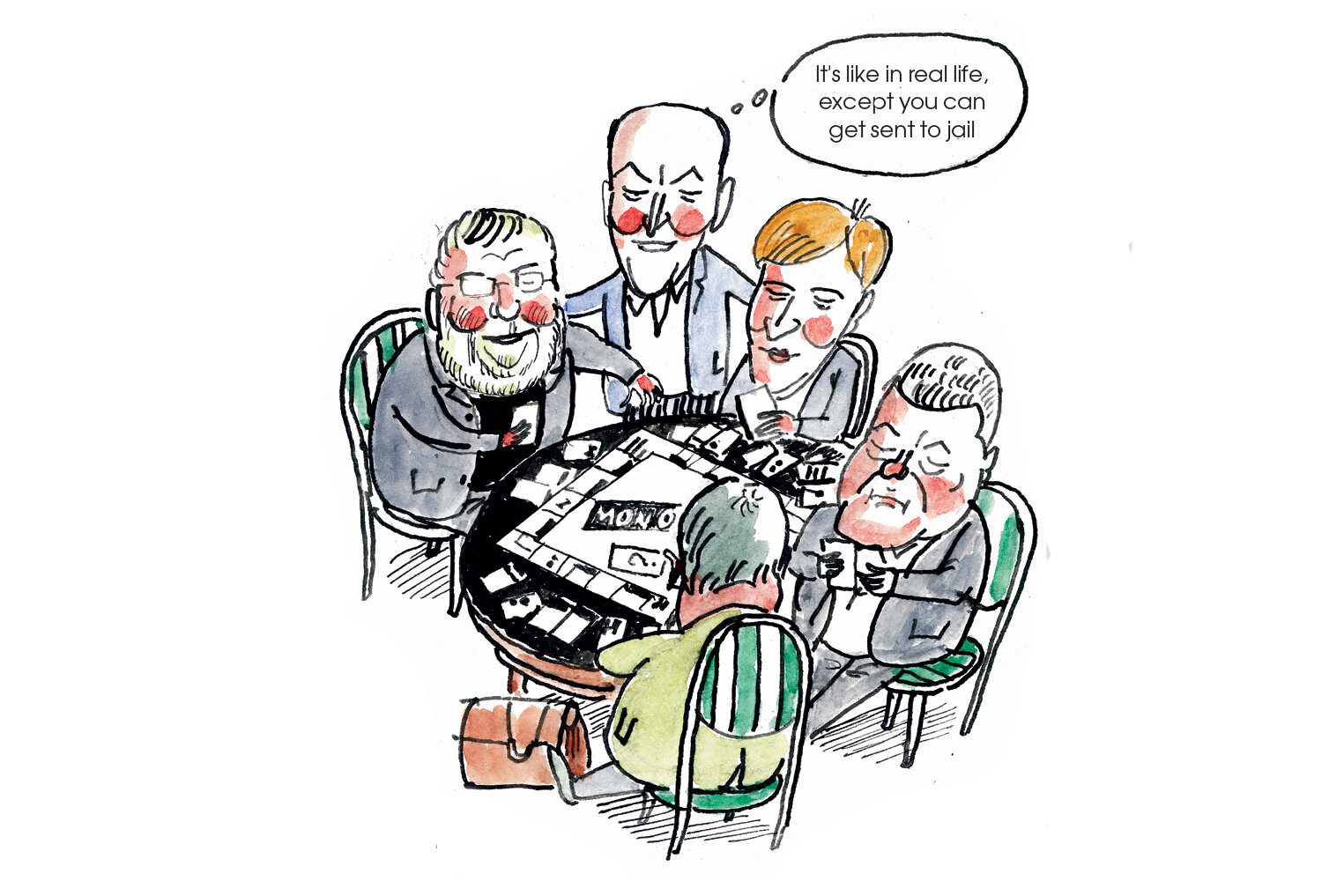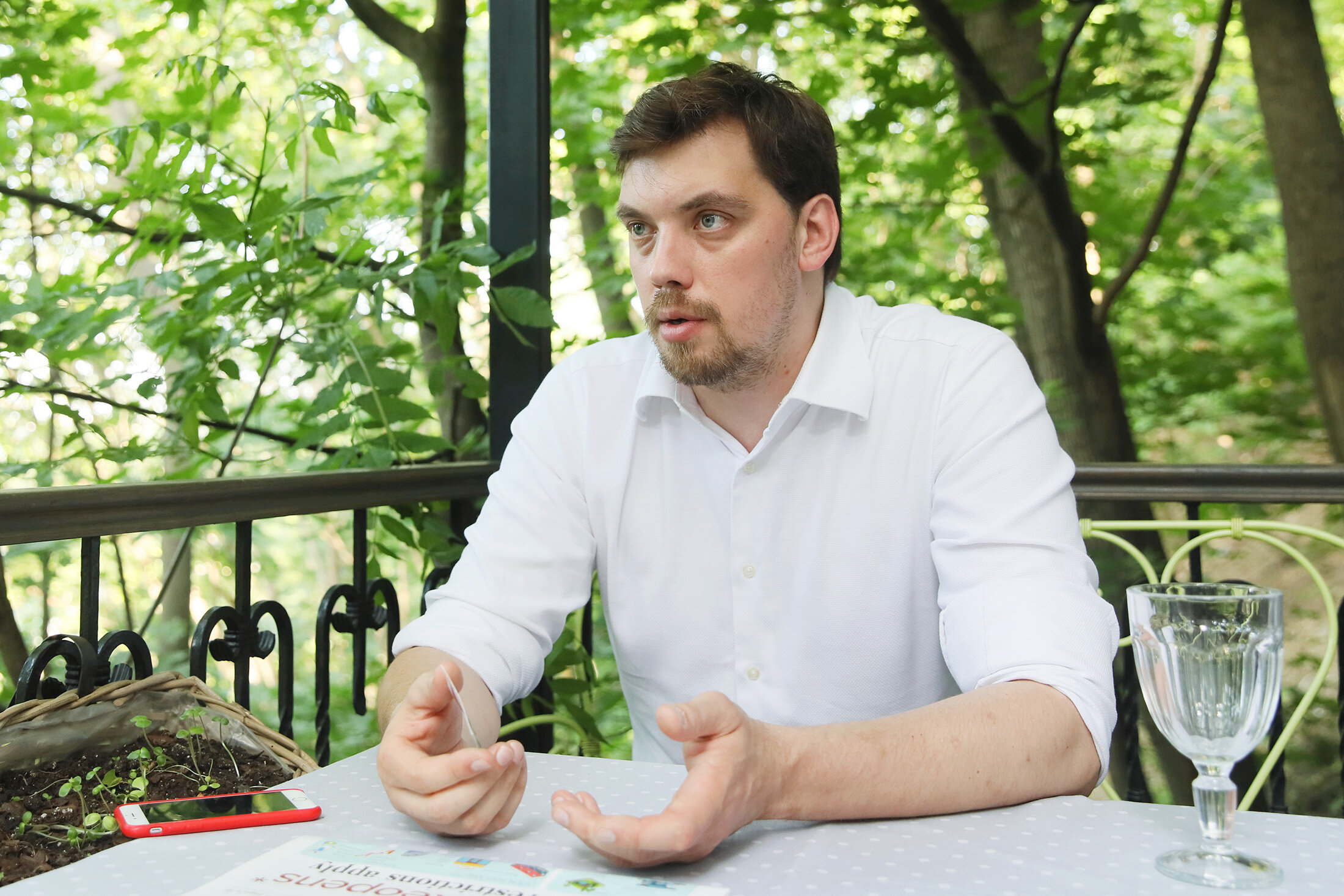Ex-Ukrainian Prime Minister Oleksiy Honcharuk says that his team needed more time than just six months to battle corruption, overhaul law enforcement and clean up the judicial system.
Instead, he thinks he and his reform-minded colleagues were ousted from the government because of their commitment to Ukraine’s state-owned banks and their opposition to the powerful oligarchs who maintain a grip on the country and its economy.
He reserves particular ire for Ihor Kolomoisky, who has historic business ties to Ukrainian President Volodymyr Zelensky. Kolomoisky faces trial in London for allegedly stealing billions from PrivatBank, which he formerly co-owned, an allegation that he strongly denies.
“The oligarchs ousted our team from the cabinet because it was impossible to make any kind of illegal arrangements with us,” said Honcharuk in a June 22 interview with the Kyiv Post. He was both the youngest and shortest-serving prime minister in Ukrainian history when dismissed from office on March 4.
Honcharuk’s accusations bring further focus to the continued power of businessmen who stand accused of robbing the country’s banking sector. While there is broad consensus in Ukraine and among its foreign partners that bank fraud drags the country down, efforts to prosecute it have had virtually no success.
Experts suggest that the same men who allegedly stole the money now pressure and manipulate Ukraine’s broken justice system and rocky politics to escape justice.
“We acted in the interests of the Ukrainian people,” Honcharuk told the Kyiv Post. “And crossed many influential groups. But in general, Ihor Kolomoisky has built up such a reputation in Ukraine that no one wants to quarrel with him.”
Oligarchs and banks
There are plenty of reasons to quarrel with Kolomoisky, who is the main defendant in a number of multibillion-dollar civil damages cases in the United Kingdom, the U.S. and now in Tel Aviv, Israel. He is also the subject of multiple criminal investigations, but has not been charged with any crimes.
The civil claims were brought by PrivatBank and the Ukrainian Ministry of Finance abroad, in the absence of any real progress here in Ukraine. The plaintiffs want to recover funds that were allegedly siphoned offshore through dozens of sham loan agreements that used fake or proxy companies over almost a decade leading up to 2016.
Already under an FBI investigation, a U.S. grand jury has reportedly now joined the case too, probing alleged money laundering by Kolomoisky. Prosecutors in the U.S. think there’s enough evidence to prove that Kolomoisky siphoned millions into prime U.S. real estate from PrivatBank deposits while his alleged Ponzi-like insider lending scheme was ongoing. He denies those allegations too.
Kolomoisky founded PrivatBank and ran it with his main partner, Hennadiy Boholyubov, until it was nationalized in 2016 when the bank faced collapse after independent auditors found a $5.5 billion hole in its balance sheet. Both of the businessmen deny all wrongdoing and have been suing to get the bank returned.

Ukrainian oligarch Ihor Kolomoisky founded PrivatBank and ran it until it was nationalized in 2016 when the bank collapsed after independent auditors found a $5.5 billion hole in its books. He’s never been held responsible for alleged money laundering, charges he denied. (Kyiv Post)
Evading justice
Despite his high profile, Kolomoisky is not alone in facing scrutiny over alleged financial malpractice in Ukraine. Widespread bank fraud and insider lending that took place in Ukraine up until 2014 cost the country at least $25 billion through a series of taxpayer bailouts, nearly tanking the country’s entire economy in the process.
Six years later, nobody of consequence has been prosecuted. Bankers and former officials now argue that the chances of getting justice in Ukraine under the current government and court system are extremely slim. Instead, they place their faith in foreign jurisdictions.
“Judging by the actions and rhetoric of the current government, it [the government] is more likely to exert pressure on the banking system than to respect its independence,” Honcharuk said of the current presidential administration.
“We all see that the government has done nothing to protect state-owned banks,” he added.
As for the courts, they are compromised and cannot be trusted, Honcharuk said: “Pressure is, most likely, exerted on the Ukrainian courts in all cases that involve Kolomoisky.”
Pressure from law enforcement
Petr Krumphanzl, the CEO of PrivatBank, also suggests that Ukrainian courts and law enforcement are more likely to apply pressure to the country’s banks and their management, as opposed to prosecuting past cases of alleged fraud.
“We still have over 500 legal cases filed against PrivatBank by the former owners and their related parties in Ukraine,” the banking executive said. “We will continue to protect the interests of PrivatBank and its shareholders in Ukrainian and international courts.”
Krumphanzl has also come under intense pressure personally.
“During the last two years I personally was interrogated [by law enforcement] about a dozen times,” he said. ”Sometimes on truly ridiculous or biased accusations. I was even accused of being a foreign spy. Other members of PrivatBank’s new management board are in a similar situation.”
“We have over 500 billion hryvnia ($18.7 billion) in non-performing loans in Ukraine,” adds Honcharuk. “So solving this problem should be a priority for the government. But, unfortunately, I do not see any actions on their behalf aimed at effectively solving it.”
Asked about bank fraud cases in Ukraine and about PrivatBank’s prospects for getting justice, Zelensky’s top banking sector adviser Viktoria Strakhova said the presidential administration opposes PrivatBank being returned to Kolomoisky.
“I believe everything shall be settled in the courts,” she added.
Unpunished fraud
Historic bank fraud remains a major story in Ukraine because of the failure to bring any culprits to justice or to recover any money that disappeared, and because of the scale of the damage caused over an extended period of time.
Valeria Gontareva, governor of the National Bank of Ukraine between 2014 and 2017, told the Kyiv Post that illegal banking practices triggered a financial crisis in Ukraine that cost the nation and its people 15% of gross domestic product.
Dozens of banks needed state bailouts totaling billions of dollars, and 90 banks were put up for liquidation or needed taxpayer support, Gontareva recalls.
One alleged fraudster, Oleg Bakhmatyuk, admitted to the Kyiv Post in a November 2019 interview that the illegal practice of insider lending was a “general tendency” in the country back then.
The agricultural businessman is accused of shady lending and embezzlement at his two banks, VAB Bank and Financial Initiative, which respectively had 64% and 96% insider loans, according to Gontareva.
Bakhmatyuk owes the Ukrainian government about $1 billion, according to the NBU, but denies any wrongdoing or that his practices resulted in those banks going bust.
On June 26 this year, the Pechersk District Court in Kyiv moved to quash all criminal proceedings against Bakhmatyuk. The National Anti-Corruption Bureau of Ukraine (NABU) said it would appeal the decision, which was helped by a controversial new prosecutor general, Iryna Venedyktova, recently handpicked by Zelensky.
Having the Bakhmatyuk case thrown out would effectively end the only major bank fraud case that is ongoing in Ukrainian courts.
In the second half of 2019, the Prosecutor General’s Office and the NABU had shown signs of ramping up some anti-fraud investigations. As prosecutor general, Ruslan Riaboshapka pledged to reopen a number of important bank fraud cases and reexamine six sets of case files on problematic banks.
“There are not any untouchable persons in this country,” Riaboshapka said in November 2019. “I enjoy the right to prosecute anybody who is guilty, even Kolomoisky.”
He didn’t get the chance. Riaboshapka was removed from his post on March 5 after a vote in parliament, where the president’s party has a commanding majority. Honcharuk was removed a day earlier in the same way.
Honcharuk said that Kolomoisky was “extremely interested” in his removal from office. “We were inconvenient for oligarchic circles,” he told the Kyiv Post.
“All the forces that were against the memorandum with the International Monetary Fund, against reforms, against the protection of state banks and against the independence of the National Bank — all of them won from our resignation,” he said.
Oleksandr Danylyuk, finance minister between April 2016 and June 2018 and then secretary of the National Security and Defense Council under Zelensky for the summer of 2019, also thinks that Kolomoisky may have benefited from Honcharuk’s removal.
Kolomoisky was trying to block the IMF program, Danylyuk told the Kyiv Post on June 16. “Therefore, any change of the government would delay the IMF program — as indeed happened — and that was in the interest of Kolomoisky.”
And when it comes to protecting the country’s state-owned banks, Danylyuk says that the government is only doing the bare minimum in order to appease Ukraine’s international backers — and its creditors, particularly the IMF.
“I believe the main consideration for the current government is not justice but fear of losing international financial assistance, which will be cut off if Kolomoisky would succeed in meddling with the system.”

Ex-Prime Minister Oleksiy Honcharuk sits for an interview with the Kyiv Post on June 12, 2020, in Kyiv. Honcharuk thinks he was ousted from the government because of his commitment to Ukraine’s state-owned banks and their opposition to the powerful oligarchs who maintain a grip on the country and its economy. (Volodymyr Petrov)
Ukraine courts ineffective
Many say that if there is going to be justice for the Ukrainian banks that lost billions, it may need to happen in a foreign court.
That’s what the former prime minister seems to think, at least: “All decisions regarding this issue in Western jurisdictions are significant for us, since there is… not as much pressure on the courts,” Honcharuk said.
“I believe that truly unbiased decisions on this case can be made outside Ukraine, rather than by our internal justice system. It is rather rare that Ukrainian courts are impartial,” he added.
Danylyuk largely agrees, and is not optimistic about the prospect of bank fraud justice in Ukraine.
“I expect more from the foreign jurisdictions,” he said, adding that Ukrainian law enforcement, its justice system and politics are badly compromised. “The whole system is broken.”
“The U. S. justice system can provide independence, decisiveness and resistance to corruption which the Ukrainian system unfortunately cannot,” Danylyuk said. “Those are important for serving justice in the Kolomoisky case, given his significant influence on Ukrainian governmental institutions.”
